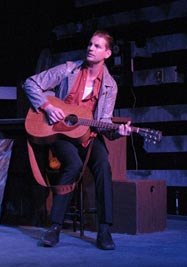 "Orpheus descending" Review, 22.01.2010
"Orpheus descending" Review, 22.01.2010by Dale Reynolds......................................
 [ перевод на русский ]
[ перевод на русский ] "Orpheus Descending,” Tennessee Williams’ 1957 reworking of his 1940 "Battle of Angels” didn’t solve the problems of the first play and wasn’t well-received. His tale of a rootless young man who stops off in a deeply hostile Southern American city and how he upsets the equilibrium of the town-folk, especially with the lives of three of the women of the town. Valentine Xavier is one of Williams’ unattainable male fantasies and, as is true of Chance Wayne in "Sweet Bird of Youth,” Brick in "Cat on a Hot Tin Roof,” and Stanley in "Streetcar Named Desire,” Val is a flashing red-hot beacon to woman and a definite threat to their screwed-up husbands.
"Orpheus Descending,” Tennessee Williams’ 1957 reworking of his 1940 "Battle of Angels” didn’t solve the problems of the first play and wasn’t well-received. His tale of a rootless young man who stops off in a deeply hostile Southern American city and how he upsets the equilibrium of the town-folk, especially with the lives of three of the women of the town. Valentine Xavier is one of Williams’ unattainable male fantasies and, as is true of Chance Wayne in "Sweet Bird of Youth,” Brick in "Cat on a Hot Tin Roof,” and Stanley in "Streetcar Named Desire,” Val is a flashing red-hot beacon to woman and a definite threat to their screwed-up husbands.The first Williams to hit L.A. this year is a fine production of a very problematic play at Theatre/Theater, directed by Lou Pepe. All of Williams’ prototypes are on display: the neurotic and willful rich-girl, Carol Cutrere (Claudia Mason); the lonely and sexually-frustrated outsider/wife, Lady Torrance (Denise Crosby) and the mad-as-a-hatter local artist, Vee Talbot (Francesca Casale), all of whom are influenced in a major way by this drifter, Val (Gale Harold). As usual in these souped-up melodramas of his, sexuality and violence are never far from the surface.
Williams meant this to be a modern retelling of the ancient Greek Orpheus legend: the inability to "not look back,” amid artistic expression and how it automatically conveys outsider status to any citizen in a society that values traditional norms, especially those that keep white heterosexual men in power. Guitar-playing Val influences Lady to open her confectionary counter in their general dry-goods business, as well as allowing Eva her right to display her abstract art, and for beautiful Carol to challenge her horrified family by sticking around, instead of accepting a paid exile.
In keeping with the times he wrote in, there can be no easy or satisfactory ending for these characters. The prevailing era of Eisenhower-conformity meant women, blacks, and those of other-than WASP roots must be subsumed to the dominant culture. Williams, as a gay man, certainly didn’t fit into the dominant culture of the time and, although he didn’t suffer the violence his characters so often do, he suffered enough. Hence, the suffering most of his outsider-characters as well.
In his lesser-plays, of which this is one, all this sturm-und-drang doesn’t hold up very well fifty years on. Perhaps in another fifty years, he will be seen as a prophet and lauded for his neurotic’s realities once again.
Director Lou Pepe understands these limitations and with set-designer David Mauer, makes good use of the small 99-seat space of Theatre/Theaterk, although the over-all look is pretty ugly. He has also cast it well, with Harold, Crosby and Mason making the most of the range of emotions they’re given. They play all the intended sexual tensions and the supporting cast of townsfolk, hypocritical and vicious as Williams believed them to be, are well played by Kelly Ebsary, Sheila Shaw, John Gleeson Connolly and Robert E. Beckwith, along with Geoffrey Wade as Lady’s dying husband and Andy Forrest as the bigoted sheriff.
And while this is lesser-Tennessee Williams, it is still worth noting. You just wish it didn’t seem all so drearily stereotypical of a time and place in our recent American history.
источник: stagehappenings.com






